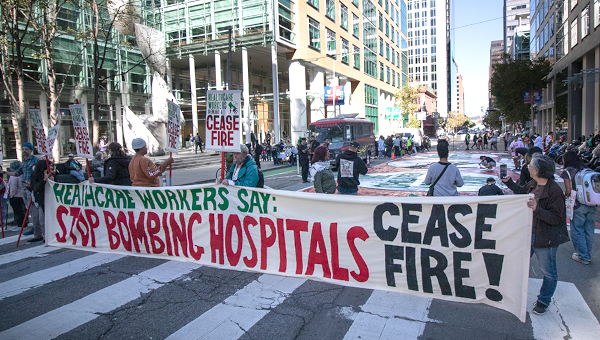Over a month has passed since Bill 115 was repealed by the Ontario Liberals, but the contracts imposed on the Ontario Secondary School Teachers’ Federation (OSSTF) and Elementary Teachers’ Federation of Ontario (ETFO) remain intact and effectively unchallenged. This has led to several incidents of open dissent from the ranks of OSSTF in particular.

Throughout the short life of Bill 115, OSSTF members have pushed their union to take a more defiant direction such as that taken by ETFO. Dissent boiled over in November when a number of OSSTF districts rejected tentative agreements being negotiated within Bill 115’s framework. In response, OSSTF leaders were compelled to cancel future ratification votes and finally implement province-wide work-to-rule, as ETFO worked toward rotating one-day, district-wide strikes in December.
However, the provincial leadership of OSSTF is still showing an unwillingness to pursue any sort of collective protest against the effects of Bill 115. On February 22, the OSSTF Provincial Council, at the Provincial Executive’s recommendation, voted to suspend the boycott of extra-curricular (EC) and voluntary activities. This has left ETFO as the only union still refusing to budge on boycotting ECs in protest. The OSSTF decision is yet another example of how union leaders have one-by-one capitulated to the government, undermining any prospects of cooperative and united efforts to defeat the government’s attacks on education workers and collective bargaining.
United Course of Action?
This is a point pondered by Jeff Kanter, an Ottawa high school teacher, who writes,
“Here’s a thought: how about the leaders of OSSTF and ETFO sit down with each other and come up with a collective, cooperative, collaborative, and united course of action?
“The most effective weapon teachers have – unified action – was seriously weakened months ago when OECTA leaders caved in to governmental pressure and accepted, without permitting a vote by membership, the now infamous MoU (Memorandum of Understanding). In spite of this setback, the elementary and secondary panels of the public system seemed to be on the same page moving forward. Now, that has suddenly changed, as the nightmare has become a dream.
“A dream for the new Liberal minority government: dissension among the teachers’ ranks. OSSTF has inexplicably caved in to provincial pressure and has supported a return to voluntary activities for teachers while getting absolutely nothing in return for these teachers other than vague notions of continuing to have meaningful and polite dialogue. What the hell does that mean?”
As Kanter points out, the Ontario English Catholic Teachers’ Association (OECTA) leaders didn’t just sell-out ETFO and OSSTF, they also sold out their own membership. The MoU involved no consultation of local bargaining units, and no ratification vote from the membership. The problems of the labour movement have not simply been the lack of solidarity between unions, but a question of democratic decision-making in the unions themselves.
Thirty Thousand Dollars
The necessity of locally-organized groups of workers focused on internal union democracy and the elementary union principle of solidarity isn’t lost on the Rank-and-file Education Workers of Toronto (REWT). On January 26, the REWT blog reported that the Secondary Teachers Bargaining Unit executive of OSSTF District 12 (Toronto) had donated $10,000 to Ontario Liberal leadership candidate Eric Hoskins. Hoskins had voted in favour of Bill 115. As the REWT blog read:
“On Wednesday (Jan 23) it was revealed via a Global News story that OSSTF D 12 had donated (sometime last December) $10,000 to the campaign of the Liberal party leadership contender, Eric Hoskins. The source for the story was factual information posted on the Ontario Elections website. Prior to the Jan 23rd story, there had been no information about this in any D12 communication to members (e-mails or website). Even in Doug Jolliffe’s president’s report to the monthly Secondary Teachers’ Bargaining Unit Council meeting of Jan 24, there was no mention of the donation. And when asked a direct question by REWT member, Luis Filipe of Parkdale Collegiate, Jolliffe’s reply was evasive, just admitting to offering ‘support’ to three of the contenders for the Liberal Leadership.”
At the time, Rankandfile.ca left a message with Doug Jolliffe, president of District 12’s STBU. We requested an interview, but we received no reply.
Because the STBU executive effectively kept their decision secret, most OSSTF members found out about this donation scandal on February 5 when the Toronto Star published an editorial revealing that OSSTF District 12 had in fact donated an additional $10,000 to Kathleen Wynne and $5,000 to both Gerard Kennedy and Glen Murray. As The Star editorial commented,
“There’s nothing illegal about the donations, perhaps even nothing improper. But it’s a cynical approach – especially when the same union demanded that teachers withdraw their involvement in students’ sports, chess clubs and theatre productions because of anger at the Liberals’ approach to contract talks. The four candidates criticized that approach, but only Kennedy promised to reopen contracts imposed on the teachers under Bill 115.”
REWT has since launched a petition circulated throughout District 12 protesting this decision and expressing non-confidence in the STBU executive.
Demands for Democracy and Membership Input
On February 27, Jim Stringer, a Manitoulin Secondary School teacher and strike captain published an open letter to Ken Coran, OSSTF president. The letter highlights a number of problems with the OSSTF strategy, as Stringer sees them. On suspension of the EC boycott, Stringer comments,
“As a result of communication issues outside your control, exacerbated by media that are unable or unwilling to report these matters factually or accurately, by Friday evening many members, and most of the public, were convinced that we had been directed to resume xc’s [extra-curriculars]. That erroneous impression has been somewhat ameliorated amongst us via subsequent communications, though not amongst the general public, including our students. In any case, the withdrawal of xc’s, the lone remaining weapon in our fight against Bill 115 imposed working conditions, is in serious question. Members feel betrayed and abandoned. This outcome was neither accidental nor unforeseeable. In fact, it should have been anticipated.”
The open letter also reveals a lack of confidence in the leadership, but plenty of confidence in the membership:
“Earlier drafts of this letter suggested that you and the PE [Provincial Executive] should resign. That was based on what I and many others see as a failure of leadership evidenced by an effective rollover on key bargaining issues, an apparent abandonment of a membership committed to a long term struggle to regain what was lost and the adoption of a strategy guaranteed to create major rifts and internal strife amongst that membership. On reflection, that seems both excessively confrontational and unhelpful to the situation. What I ask instead is that you undertake at the earliest possible opportunity, and certainly before you proceed further down the path of discussion with the province, to survey the membership on the issue. Are we willing to accept the strips [concessions]? If not, are we prepared to stand firm until we achieve a satisfactory resolution. I am confident that you will be surprised by the strength of the resolve of the membership.”
Another petition is also being circulated by OSSTF members calling upon Coran and the provincial executive to halt all negotiations with the government until there is input by the membership. Like Stringer’s letter, this is in direct response to the OSSTF provincial leadership abandoning the boycott of ECs.
The OSSTF Annual Meeting of the Provincial Assembly
The extent to which the membership is willing to challenge the leadership and push for more membership participation, will be put to the test at the upcoming OSSTF Annual Meeting of the Provincial Assembly (AMPA) held in Toronto from March 8-11. The body is the “supreme legislative body” of OSSTF and will be determining policy, bylaws and holding provincial executive elections.
There is at least one electoral challenge being mounted from the general perspective of the dissident voices cited in this article. Tim Heffernan, a high school history and social studies teacher and REWT member who blog-posted about the District 12 donations, will be a candidate for the provincial executive.
What happens at AMPA will provide some important insights into how Bill 115’s effects are being fought, if at all. It was clear in January that in the face of an Ontario Labour Relations Board ruling against ETFO’s planned one-day strike, that both ETFO and OSSTF leaders were unwilling to endorse legitimate civil disobedience against profoundly unjust and illegitimate laws, including the outrageous use of the OLRB against the unions while Bill 115 barred the unions from contesting any aspect of the bill through the OLRB. These are of course difficult decisions to take, but it is obvious that capitulation has become all too easy even when all signs point toward a real commitment to strike from the membership.
The alternative has been attempts at negotiating with the government in the absence of job action as a weapon. The perception of Wynne as being somehow more labour-friendly than McGuinty has allowed her to do what McGuinty couldn’t – quell the labour unrest to a fair extent in Ontario’s public schools. Wynne has made no concessions or promises and she has managed to isolate ETFO and neutralize OSSTF.
Portrayed as somehow more progressive on labour issues than McGuinty, it’s worth reminding ourselves what Premier Wynne said about why she voted for Bill 115:
“If I hadn’t voted for Bill 115, as I’ve said to my teacher friends and colleagues, the premier would have had to ask me to leave cabinet. And I determined that it was more important for me to be there to continue to voice my opinion than to vote against the bill and leave cabinet. But that does not mean that the decisions were all good. They clearly weren’t.”
To put in another way, Wynne would rather stay in cabinet and express dissent behind closed doors after the bill has become law, instead of voting on principle in an open, democratic manner. Somehow, some labour leaders think this lack of principle and backbone is worthy of support.
The future of the labour struggle in Ontario’s education sector is still up in the air, but the saga of Bill 115 does not inspire confidence in the broader labour movement’s ability to fight off right-to-work legislation being proposed by the Hudak Tories who continue to lead most polls. If teachers and the rest of labour movement are to change course toward a more effective fightback strategy then a clearer understanding of the balance of forces of all the actors is needed. What are the strength and weaknesses, divisions, strategies and motivations of the three major parties, the union leadership and the rank and file workers?
The current dissent within OSSTF points toward signs that the labour movement can be renewed through rank-and-file organizing around greater democratic participation and accountability in unions, and more principled stands against anti-union and anti-worker legislation. •





